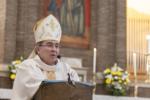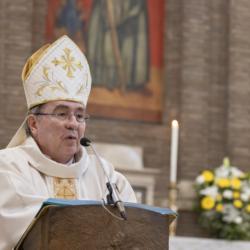Uniting our Work to God
When we look at a plan of life, the spiritual practices meant to help us unite our whole life to God, it's key for us to examine how to unite our work to God.
Most of us spend, after all, at least 25 percent of our week -- from the time we're five through when we're 65 or older -- doing some form of work. Cumulatively the only activity to which we will dedicate more time over the course of our life on earth is sleeping.
May 1's Feast of St. Joseph the Worker is a good opportunity for us to examine the importance of work in a plan of life and in God's plans for our holiness and happiness.
The Catechism of the Catholic Church says that we pray as we live and live as we pray (CCC 2725). If our work is done apart from God, if we work as functional atheists, it's going to be harder for us to unite ourselves to God even in prayer. But if the work we do unites us to God, then it will become one of the most potent means of our sanctification.
In the beginning of time, God gave us the vocation to work, which was meant to bring creation to perfection. He commanded us to do three different forms of labor: to "increase and multiply," cooperating with his creative power to bring new human beings into existence; to "fill the earth and subdue it," by bringing forth the earth's inner potential, producing fruits and vegetables from the soil, glass and computer chips from sand, medicines from plants and more; and to "have dominion" over all living creatures and treating them as gifts of God.
God gave us this vocation to work because through work we would become more and more like him, who himself worked in creation and, as Jesus would later say, "works still" (Jn 5:17). Work is meant not only to produce something but to perfect us, by bringing out our potential just as much as we bring out creation's potential. We see this, for example, in the study that forms our brain, in the physical labor that forms our muscles, in the caring for children and others that forms our heart. This "intransitive" effect of work is even more important than its "transitive" outcome. St. Gregory of Nyssa would even say that through our work we become our own parents, through forming our character through work well or shoddily done.
After the Fall, our work became arduous. There would be pangs in childbirth, working the fields would become toilsome and sweaty, and animals would often rebel. But we retained the vocation to work, because work remained good and would now become a means of our redemption: a pathway to overcome our selfishness by working for others, for the family we're supporting, for the persons receiving the fruits of our labor, even out of gratitude for our employers or employees, clients and vendors, without whom, in many cases, our work would not be possible.
We should never forget that Jesus spent most of his time on earth, not preaching, but working as a construction worker (tekton in Greek, Mk 6:3). He built houses, made tables and wheels and produced lots of other needed items. He would say that he always did what was pleasing to the Father and this work over the course of two decades was part of that glorification.
So great was Jesus' appreciation for human work in the divine plan that he could not stop using it as an analogy for the kingdom of God. He favorably mentions shepherds, farmers, doctors, sowers, householders, servants, stewards, merchants, laborers, soldiers, cooks, tax collectors and scholars. He compares the work of evangelization to the manual work of harvesters and fishermen.
Since work is so important in God's plans for us, how do we pray it, so that it might bind us to God throughout the day? Here are three suggestions.
First, to view our work as an offering to God, seeking to make of it something similar to the pleasing sacrifice of Abel. When we do anything for God, we do it better and it makes us better. I keep a statue of St. Joseph on my desk to ask him to intercede for me to offer my work like he did his.
Second, to offer it for a special intention. I offer each hour for one of the people or intentions for whom I've promised to pray. I begin each hour with a brief prayer for the person and ask God to receive the intellectual, physical, or other labor over the course of the following hour for that person. Such a practice also helps me to work with greater concentration and dedication and make my work a liturgy of the hours.
Third, to bring our work to prayer and our prayer to work. In the Morning Offering, I call to mind the work awaiting me and ask God for the grace to unite all of it to the offertory of Mass I'll celebrate later that day. At night, I examine my conscience as to how united my work was to God, how well I sought to do it, and how I cared for those people whom I met through my work.
Many of the virtues we learn in prayer -- perseverance, humility, doing it in Jesus' name, seeking God's will and glory -- are the same virtues that help us to sanctify our work. And the virtues we learn working -- punctuality, dependability, diligence, doing the best we can on any given day -- can all help us to pray better. Ora et labora, prayer and work, are meant mutually to strengthen each other and when done well they do.
Work is not fundamentally about earning a paycheck but about serving and loving God and others: in short about helping Christ as light, leaven and salt to save the world. Our desk, sewing machine, keyboard, kitchen, classroom, workbench, operating room, field or boat, is meant to become an altar on which we can offer ourselves to God together with the work we do.
When work takes on this meaning, it helps sanctify us while at the same time we and our work become means through which God can sanctify others. That's why work is an essential part of any plan of life.
- Father Roger J. Landry is a priest of the Diocese of Fall River, Massachusetts, who works for the Holy See’s Permanent Observer Mission to the United Nations.



















